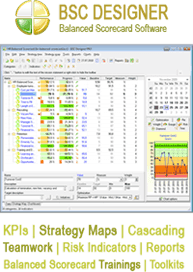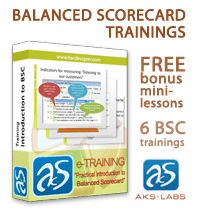BSC Questions Supply Answers to Most Management Problems
BSC questions are focused on the what, who, and when questions that management has to contend with in order to run an organization efficiently.
To illustrate, take for example a manufacturing company that intends to increase its product market share substantially within the next 5 years. Basically, top management will be responsible for working out the general strategies and projections, leaving the details to be supplied by subordinates. However, even at this level, some of the basic decisions that they will allow subordinates to answer the basic questions of what, who, and when have already been made. Top management balanced scorecards are not expected to supply the minute details, but should be meaty enough as to permit them to monitor and evaluate further developments in the plan.
It is the details of the what, who, and when questions that make balanced scorecards excellent management efficiency measurement tools. Adequately answering the what question means identifying effective strategies and their accompanying activities. Depending on the size of the company, this might require in-depth analysis of the possible negative or positive impacts of available options to the plan of increasing market share.
By answering the who question, balanced scorecards establish authorities and responsibilities for accomplishment of plans and activities. Each activity that accompanies strategies is assigned to specific point persons or groups who become responsible for its implementation. The scorecards establish mechanisms facilitating employee or departmental interfacing to promote cohesion in actions related to the implementation of the plan. This is a crucial scorecard role since there are more people involved, and this often leads to frictions and overlapping functions.
Obviously, the who question is not just about giving out assignments and delegating responsibilities. It also deals with both human and financial aspects. Balanced scorecards make sure that demands of the jobs match employees’ skills by assigning jobs to employees who already have the required skills or identifying upgrading courses. The involvement of finance in these activities as well as in other aspects of the plan is pervasive. The who question that balanced scorecards strive to answer is more complex than it seems.
Of the three basic balanced scorecards questions, the when question is easiest to answer, but critical just the same. There are such things as synchronization to think about. Balanced scorecards have to be formulated in such a way that activity timeframes facilitate accomplishment of activities and contribute to efficient performance of employees in their assigned tasks. Aside from this, balanced scorecards should feature monitoring mechanisms that adequately forewarn employees when they are falling behind stipulated schedules. The absence of this mechanism will render balanced scorecard useless, as delayed accomplishments can throw the whole operating system into chaos.
BSC questions cover a lot of ground. This is the reason why balanced scorecards are popular tools of analysis and measurement. It provides the answers to basic questions related to efficient management of people, resources, and time. It is a flexible tool and can contain all the essentials that management requires, from breaking down general plans into small workable units to establishing company routines that reflect goals and objectives.
—
If you are interested in BSC Questions, check this web-site to learn more about metrics questions.


